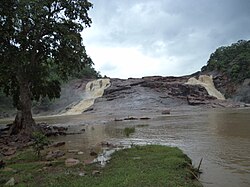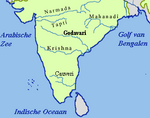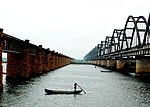Adilabad district
Adilabad district | |
|---|---|
 | |
 | |
| Country | |
| State | |
| Headquarters | Adilabad |
| Mandalas | 18 |
| Government | |
| • District collector | Rajarshi Shah [1] |
| • Parliament Constituencies | Adilabad |
| • Assembly constituencies | Adilabad, Boath (ST), Khanapur (ST) |
| • MP | Godam Nagesh (BJP) |
| Area | |
• Total | 4,153 km2 (1,603 sq mi) |
| Population (2011) | |
• Total | 708,972 |
| • Density | 170/km2 (440/sq mi) |
| Demographics | |
| • Literacy | 63.46% |
| • Sex ratio | 989 |
| Time zone | UTC+05:30 (IST) |
| Vehicle registration | TG–01[2] |
| Website | adilabad |
Adilabad district is a district in the northern area of Telangana, India. It is known as the gateway district to South and Central India.[3] The district's headquarters is the town of Adilabad.[4]
Adilabad district is bounded by Asifabad district to the east, Nirmal district to the south, and the state of Maharashtra to the north and west. As of 2022, it is a part of the red corridor.[5]
History
[edit]Historically, Adilabad was known as Edlabad during the rule of Qutub Shahis.[6] The district was named for Ali Adil Shah, sultan of Bijapur.
The heavily forested Godavari basin[7] was inhabited during the Mesolithic and Paleolithic periods. Excavations have taken place in the surrounding areas of Luxettipet, Asifabad, Boath, Bhainsa, and Nirmal.[8]
The district was ruled at different times by different dynasties, including the Mauryas, Sathavahanas, Kakatiyas and Gond Rajas.[9] Some Telugu inscriptions made during the time of the Kakatiya dynasty have been found in the Adilabad District, which indicates the historical importance of the area.
Due to the district's reorganization in October 2016, the erstwhile Adilabad district was divided into four districts: Adilabad district, Komaram Bheem Asifabad district, Mancherial district, and Nirmal district.[3]
Geography
[edit]The Adilabad district is located in the Telangana state of India. It is bordered to the north by Yavatmal district and Chandrapur district of Maharashtra, to the east by Komaram Bheem district, to the southeast by Mancherial district, to the south by Nirmal district, and to the west by Nanded district of the Maharashtra. It occupies an area of 4,153 square kilometres (1,603 sq mi).[4]
Demographics
[edit]According to the Census of India, the residual Adilabad district has a population of 708,972, with a sex ratio of 989 females to 1000 males. 23.66% of the population lives in urban areas. The literacy rate is 63.46%. Scheduled Castes and Scheduled Tribes make up 99,422 (14.02%) and 224,622 (31.68%) of the population respectively.[4][10][11]
Religions
[edit]Badankurti village in Khanapur mandal of the erstwhile Adilabad district (now in Nirmal district) was explored and remnants of a Buddhist monastery were found on a small island of Godavari river near Badankurthi.[13] The town of Bhainsa was probably related to early Buddhist times, as a pair of carved feet near a mound were found.[14] The residual Adilabad district is Hindu dominated. Islam is the second largest religion, with the majority of Muslims living in urban areas. Buddhism, which has a long history in the district, is also present among the Marathis.
Language
[edit]In the residual district, 36.50% of the population speaks Telugu, 19.67% Marathi, 17.23% Gondi, 10.23% Urdu, 7.10% Lambadi, 2.92% Kolami and 2.05% Hindi as their first language.[15]
Ethnicities
[edit]The major tribal groups in the area are the Adivasis: Gonds, Kolams, Pardhans, and Thotis. Adilabad is also known for Imran the Tree Maker.[16]
Economy
[edit]In 2006, the Indian government named Adilabad as one of the 250 most backward districts (out of a total of 640) in the country.[17] It is one of the districts in the state of Telangana, currently receiving funds from the Backward Regions Grant Fund Programme (BRGF).[17]
Administrative divisions
[edit]
The district is divided into two revenue divisions, Adilabad and Utnoor. These two divisions are sub-divided into 19 mandals.[4] Sri Rajarshi Shah is the current revenue District Collector for the District.[18]
Mandals
[edit]The below table categorizes 19 mandals into their respective revenue divisions in the district:[19]
| S.No. | Adilabad revenue division | Utnoor revenue division |
|---|---|---|
| 1 | Adilabad (urban) | Indervelly |
| 2 | Adilabad (rural) | Narnoor |
| 3 | Mavala | Gadiguda |
| 4 | Gudihatnoor | Utnoor |
| 5 | Bazarhatnoor | |
| 6 | Talamadugu | |
| 7 | Tamsi | |
| 8 | Bela | |
| 9 | Boath | |
| 10 | Jainad | |
| 11 | Ichoda | |
| 12 | Neradigonda | |
| 13 | Sirikonda | |
| 14 | Bheempur |
See also
[edit]References
[edit]- ^ "Adilabad District | Welcome To Adilabad District Web Portal | India". Adilabad.telangana.gov.in. Retrieved 20 March 2022.
- ^ "Vehicle Registration Codes For New Districts in Telangana".
- ^ a b "It's raining mandals in divided Adilabad". The Hindu. 6 October 2016. Retrieved 8 October 2016.
- ^ a b c d "Adilabad district district" (PDF). Official website of Adilabad district. Archived from the original (PDF) on 10 January 2017. Retrieved 29 June 2017.
- ^ "Adilabad Police on High Alert over Maoist Movement". 14 May 2022.
- ^ "Hyderabad State". Atlantic Publishers & Distri. 26 July 1937 – via Google Books.
- ^ "Indian Archaeology Journal 1974–75" (PDF). ASI. Archived from the original (PDF) on 8 May 2012. Retrieved 10 May 2013.
- ^ "State Archaeology of Andhra Pradesh" (PDF). State Archaeology and Museums of Andhra Pradesh. Archived from the original (PDF) on 27 September 2013. Retrieved 10 May 2013.
- ^ "History | Adilabad District | India". Retrieved 13 September 2020.
- ^ "Demography | Adilabad District | India". Retrieved 13 September 2020.
- ^ "District Census Hand Book – Adilabad" (PDF). Census of India. Registrar General and Census Commissioner of India.
- ^ "Table C-01 Population By Religious Community: Andhra Pradesh". censusindia.gov.in. Registrar General and Census Commissioner of India.
- ^ "Article about Buddhist Site at Badankurti". The Hindu. 18 May 2011.
- ^ "A.P. Ancient Monuments and Archaeological Sites and Remains Act" (PDF). aparchaeologymuseum. Archived from the original (PDF) on 27 September 2013. Retrieved 10 May 2013.
- ^ a b "Table C-16 Population by Mother Tongue: Andhra Pradesh". Census of India. Registrar General and Census Commissioner of India.
- ^ S. Harpal Singh (19 May 2015). "Adivasi education is still a mirage in Adilabad". The Hindu.
- ^ a b Ministry of Panchayati Raj (8 September 2009). "A Note on the Backward Regions Grant Fund Programme" (PDF). National Institute of Rural Development. Archived from the original (PDF) on 5 April 2012. Retrieved 27 September 2011.
- ^ "A Revanth Reddy appoints collectors for new districts". Deccan Chronicle. 11 October 2016. Archived from the original on 11 October 2016. Retrieved 13 October 2016.
- ^ "Clipping of Andhra Jyothy Telugu Daily – Hyderabad". Andhra Jyothy. Archived from the original on 9 October 2016. Retrieved 8 October 2016.
External links
[edit]- Adilabad district official website Archived 26 September 2011 at the Wayback Machine




